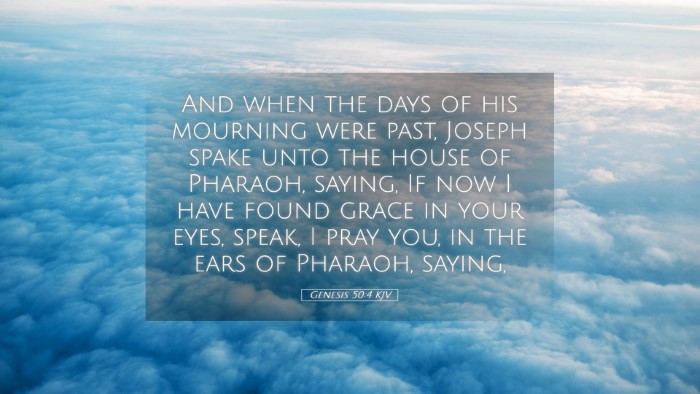Commentary on Genesis 50:4
Genesis 50:4 states: "And when the days of his mourning were passed, Joseph spake unto the house of Pharaoh, saying, If now I have found grace in your eyes, speak, I pray you, in the ears of Pharaoh, saying, " This verse captures a significant moment following the death of Jacob, Joseph's father, and offers profound insights into themes of mourning, restoration, and the responsibilities of leadership.
Contextual Background
The ending of the book of Genesis marks the closure of the patriarchal stories, with Jacob's death signifying a transition in the narrative. Joseph's rise to power in Egypt juxtaposes the emotional weight of familial loss against his newfound authority. This moment in Genesis reflects how personal grief and the responsibilities of power can coexist in the life of a leader.
Insights from Public Domain Commentaries
Matthew Henry's Commentary
Matthew Henry notes that Joseph's mourning for his father was not only a personal loss but also a moment for reflecting on the legacy that Jacob left behind. Joseph, in his grief, demonstrates the importance of honoring family ties and the emotional weight they carry. Joseph's request to speak to Pharaoh for permission to fulfill his father's last wishes reveals a humble yet assertive approach to leadership.
- Mourning as a communal expression: Henry expounds that the mourning period was communal, indicating the respect and honor afforded to Jacob by both his family and the Egyptians.
- Joseph's grace and humility: His appeal to Pharaoh reflects Joseph's understanding of authority and the protocols necessary to navigate the political landscape of Egypt.
Albert Barnes' Notes on the Bible
Albert Barnes emphasizes the importance of the mourning period, illustrating how Joseph, despite his high status, chose to reflect on sorrow as a shared human experience. Joseph's actions underscore the significance of properly mourning and honoring his father's memory.
- The etiquette of leadership: Barnes points out that Joseph adheres to the cultural norms of his time, seeking Pharaoh's permission, which serves as an example of respect for established authority.
- Intercession for family: Joseph's advocacy underscores a model for intercession within family dynamics, where leaders seek favor not just for themselves but for their households.
Adam Clarke's Commentary
Adam Clarke provides a detailed exploration of Joseph’s communication skills and emotional intelligence as he navigates a delicate situation. Clarke notes that Joseph's mourning mirrors the cultural practices of ancient Egypt, where such public displays of grief were integral to honoring the deceased.
- Cultural practices and personal grief: Clarke highlights the intersection of personal feelings and societal expectations, showing how Joseph balanced his duties with his grief.
- Leadership in mourning: Leadership is about guiding others through emotions as much as through actions; Joseph embodies this by asking for a respectful burial for Jacob, emphasizing the significance of family and heritage.
Theological Implications
Genesis 50:4 not only addresses the practicalities of mourning and burial but also presents theological implications regarding leadership and legacy. It raises essential questions for modern readers about how they navigate personal grief within their professional responsibilities.
- The balance of grief and duty: This passage serves as a poignant reminder that leaders are human, subject to emotional burdens while carrying significant responsibilities.
- Honoring the past: Joseph's actions reflect a vital theological principle—the importance of honoring our heritage and preserving our familial legacies, which resonate with the wider biblical narrative.
Practical Applications
For pastors, theologians, and students of the Bible, Genesis 50:4 offers rich applications for ministry and life:
- Modeling grief in leadership: Leaders should embrace their grief and allow it to inform their practices, demonstrating vulnerability and authenticity to those they lead.
- Community mourning: The importance of communal expressions of grief can foster deeper connections within congregations and communities.
- Intercessory leadership: Joseph's example is a call for leaders to advocate for their families and communities, intertwining personal faith with broader service.
Conclusion
Genesis 50:4 encapsulates vital lessons about the intertwining of personal grief, leadership responsibilities, and the significance of honoring one's heritage. By drawing insights from public domain commentaries, we can appreciate the depth of Joseph's character and the broader implications for our lives today. These themes remain relevant, speaking to the challenges faced by contemporary leaders in maintaining dignity and compassion amidst their duties.


